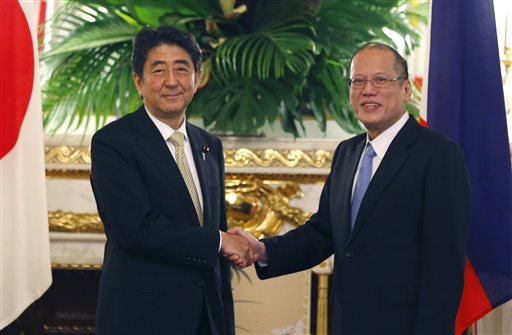
President Benigno Aquino III, right, shakes hands with Japanese Prime Minister Shinzo Abe prior to their meeting at Akasaka Palace state guesthouse in Tokyo Thursday, June 4, 2015. AP Photo/Shizuo Kambayashi, Pool
TOKYO – Sharing the concern for threats to regional peace and stability, Philippine President Benigno Aquino III and Japanese Prime Minister Shinzo Abe signed on Thursday a joint declaration enhancing the two countries’ strategic partnership, agreeing to begin talks to exchange defense materiel, undertake more joint training exercises and ensure “maritime safety and security in the disputed South China Sea.
The two leaders signed the Tokyo declaration at the end of bilateral talks here early Thursday evening, following wide-ranging bilateral talks at the Akasaka Palace here.
The five-page declaration, which bolstered the strategic partnership the two nations first signed in 2011, also covered stronger “collaboration for economic growth” in the Asia-Pacific, and the pursuit of “enduring peace” in Mindanao.
A major part of the pact covers stronger defense ties between the two countries, including the “initiation of negotiations to conclude an agreement on the transfer of defense equipment and technology.”
Coming at a time when Japan has started rethinking its pacifist policy in the face of growing regional threats, the joint declaration also provided for the “expansion of bilateral and multilateral trainings and exercises for capacity building in areas including those covered by the memo on defense coopertion and exchange.”
In his remarks at a joint press conference, Abe issued an unequivocal condemnation of China’s reclamation activities in the South China Sea, part of which is being claimed by the Philippines.
“We once again confirm that we share serious concern about the large-scale land reclamation, and that we oppose attempts to unilaterally change the status quo,” said Abe.
He also again expressed support for the arbitration case the Philippines had initiated against China, to compel the military power to back off its exclusive economic zone in the South China Sea.
“We also agreed to thoroughly uphold the principle of the rule of law, and I once again conveyed our support for the utilization of the arbitration procedures by the Philippines,” he added.
Indirectly referring to China, meanwhile, President Aquino asserted the two nations’ commitment to urging other countries “to act responsibly” given “security challenges that confront both our nations.”
“We believe this can be done through finding just and peaceful solutions to our territorial disputes and maritime concerns by upholding the rule of law, towards creating a secure and stable environment that serves as the bedrock of our collective progress,” said Mr. Aquino.
In the Tokyo declaration, the Philippines and Japan reaffirmed “their strong commitment to ensuring maritime safety and security, including in the South China Sea, which is a vital element for peace and prosperity of the region including both countries.
It also reiterated the commitment of both sides to advocate freedom of navigation.
“Both countries reiterate their resolve to contribute to peace and stability in the international community…. Maintaining open and stable seas is essential in ensuring regional stability and is an imperative issue which both countries, as maritime nations,” the declaration read.
Amid continuing Chinese incursions in disputed waters, the declaration issued a common call for coastal states to “refrain from unilateral actions that would cause permanent physical change to the maritime environment in areas pending final delimitation.”
The two sides also underscored “the importance of [the] peaceful settlement of maritime disputes based on international law,” such as the United Nations Convention on the Law of the Sea.
The Philippines is invoking the same treaty in urging China to stop its incursions in the South China Sea, resting the thrust of its arbitration case on this international law.

